新编大学英语4原文The Power of a Note
- 格式:doc
- 大小:20.50 KB
- 文档页数:2
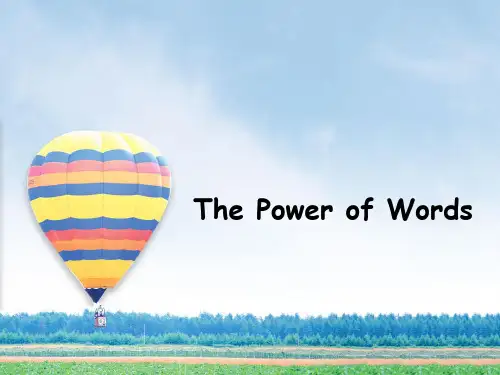
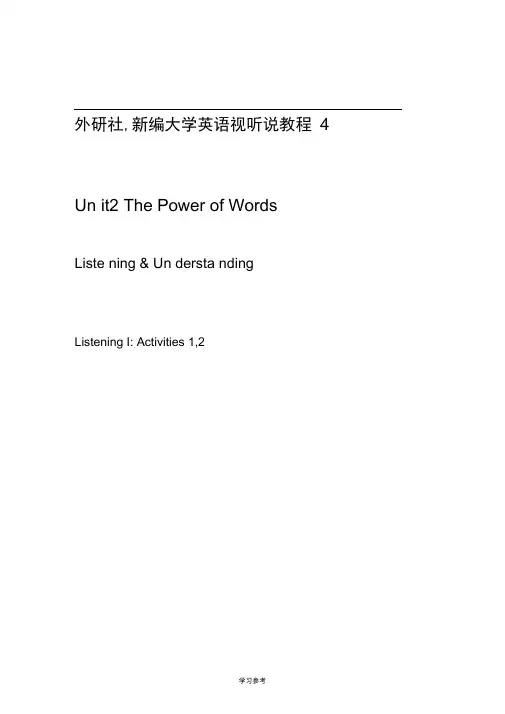
外研社,新编大学英语视听说教程4 Un it2 The Power of WordsListe ning & Un dersta ndingListening I: Activities 1,2■丿Li石ten to a story abaut two ians and two Dirtchmen on a train and choose ths best answer to each of Itic questicMis you h^ar on the recording:.\ Click to iKtentf>th« que&tnn.V/here did ttie s-tory take place7(a) ii a theater.(b) in a workplacev «■ fc) On a tram.(d) On a plane.2. Click to lislen tc th& aueMion.'//hat d i:he rwo umcnmen want to know iromthetwo E&igiar^?* a ⑻ How tney managed to trav^t witn only or^e ticket.(b) Wtien they started to travel to work by train-[cj Ho\.v they usuaiy killed time on the train.How far their home io th&ir workplace is.3. Click to listen to the questionHew di: ttie Dutch men fee about the Belg ;ans t^bavicr'?O Indifferent.:?■ m Criticaf.(c) Happy* 0 fd) Approving4. Click to listen to the qu&stionV/rat tfkf che Be^ian do \?hen 3SK&d if he fiad a licK&t?© (a) He kept silent..:■ [b) He told a lie.* a- tc) He told ihe truth.t<±) He showed thein his bdel.£ Click . - to lisien tc the que-sticin.V>ho ^ir.alfy marags-d to tra/ei free cf cbflne>■ [ajTheiwo Belgians* fb) One cf the t:vc Belgians.x o [cJTrt^twc Dutchmen.g) One of the two Dutchmen*Listen to the story again and complete the following summary with the information you get.The hvo Belgians 已jtplamed that v/hen mey neard the tonau 匚to 『 1 刖rii] from tne other end of H IE carriage they(2 _______ th^ir seats, went Into the (3) _______ a nd:4 Q:知 _________ me door When the conductor KnocKetf on trie toilet door saying 1"(5)TlcKets pleasethey (6)pushed one ticket undertrie door It was then 7 sia^rrd and pushed Dacfc under the tloor again.Your answer approaching Jentoilet lockedTickets please pushed stampedCorrect answerapproaching feft toilet focked Tickets please pu&hed stampedA/u. w 3 4 5 6 7i 2 /rlListening II: Activities 1,2Listen io a Japanese talking about her story in ail Ameri 匚自 n university and complete ttie following sentences with tiie informatiQn you get.Your answerCorrect answervdepartment staredepartment storeSix years ago AtsuKo went to me Unitetl States tor^eni : rYour answerCorrect answer vattend collegeattend coilegeAt&uko found life in the United States very chfftciilt ___________ .Youranswer7difficultAt&uko found physicalgjmionYour answerCorrect answervphysical educationphysiceducaHionAtsuko felt £E 「nfiEd _______ because she was asked to hit the ball to her classmates.Listen to the storyand choose whether each of the following statements is1. At&uko works as a salesclerk in a big : n 已nt 空 巳in 」apanCorrect answer difficult匚 la&s very difTicuH4. Your answer7terrified Correct answerterrifiedtrue (T) or fa tee (F)L1 Atsuko Knew a lot 日bout American ire before sine went to the UnitedStates(a) Truey o (t>) False2 AtsuKo vras greatiy encouraged by Deyoung man and succeeded inhitting the hail”u a (a) Truep>) False3 Atsuko thinks of trie words the young man said to her whenever she is in difficulty. y4 (a) T rue(D) False4 Atsuko is sure Wat me young man how much his words meant toner.(a) T ruey a (t>)Fai&e5 The main id^a of the story is that encouragement can worK Era匚I巳sy * (a) True(&) FalseListening III: Activities 1,2Kate Austen is an Australian nurse who has written an elderly lady a letter to thank her for mailing missionary p已亡kege^. Here is the reply the elderly lady &entlo Kate.Listen to the first psrt of the letter and answer the Fcllownig questions.1 How old is the American lady?80 “Suggested 3nsL\e:;8C2. What does she Knit?CapB> sweaters and scarves *w Suggested answerCsps sweaters and scarves3. Who wrote the letter^Th亡elderly lad.y f s daughter-in-la?fSuggestanswerThe elderly lady s daughte--in-Jaw.4. Why couldn't the elderly lady write the letter herself?3-2CE口mm she was bli nd.Suggested answerBetause she shnd.5. H OVJ old was she when stie got married?13Suggested answer ig.6 Where did the couple 训ork fior 40 years*?亡hi naSuggested answerChina7 How many of her children are still alive now?OneSuggested answerOre.8. Where did the elderly lady go after her husband died?Torczita4TSuggested 白n sw&rTorontoListen io the second part of ihe letter and complete the fallowing paragraph with the information you get.wnai I most wanted to say is iriis. For ;'?u ___________ years I have been ;2〕爪卄旧 jjp missionary packages of clothing lood medicine or books. I have 光nt them to (3)_____ of the world.Sometimes 丨 nave received a (4}printed _______ slip oT acknowledgement, sometimes nothing.侍)beftxE In alt the-se years hav 色 I H 合d 呂 (6} (describing thevillage and telling me who arewearing tfie clothing siricl ^hatthey g 白闭 I never thought that in my lifetime I would receive 3 letter like that May G&d i7 ;______Your answer Correct answer60 making up various parts printed Never k>efo-re persona] letter bless you80 / sixty making up various parts printed Never tjelore pers-onal better bless youLI/ \r. 11/ VJ .1>. 1 2 3 4 5 6 7 .1. fL- /LY Jck —(V/I zmvListening IV: Activities 1,2Listen to an interview with a woman, talking about sonnettiing she expcrienc&d in S inga pore end complete the following sentences with the rnformation you get.The woman described a :帘口门叮巳厂慎^门口和口 she '.vorKed in Singapore.5 / fiveWhat the assistant ^aid to the woman IH her to:belfeve she had got can 匚色「cancerThe doctor reassured the woman on the phone by F E Hing her everything was [ine .Lrs-ten to the interview in and choose whether each of the following statenn&nU is true(T) or fake (F),1 The woman said that she was scared t>ecause of the pain in her legshe had experienced whe 口Your answerCorrect answer vfnisun derstandingThe woman said she r d had m ‘Tipmisunderstanding on n er left iegYour answerCorrect answerlump / red lumpvlumpAfi^rth^ &per 白tiom the w&man wa& told to return 闇 5 haveher stitches out and get h&r results.days toYour answer Correct answerYour answerCorrect answercancer Your answerfine Correct answerfine7 9(a} True(b) False2 The doctor took tti€ lump to the lab for tests匚(a) Truev 9(b> False3 The Ionian returned to lhe ho&pital six days after the operation.(a) Truew i> (b> False4 The woman described ho>v nervous she Mad t>een when she asKed tor her results # d (a) Tru«(b) False5 The doctor apologtzed on the phone tor his assistants misunderstanding7 o (a> 丁ru£(D) False6 The misu nQf「戏冃nding erose because the assistant tiad mistaKen the woman toranotherpatieniTru-eJ»(b) FalseView ing, Un dersta nding & Speak ingActivities 1,2, 3I Watch a video of four people Trying to help an orphan who wrote a. letter to Godand choose whether eacti of the following statements is true (T) or false (F).1 T QITI wrote a letter to God ir»whrch he 匚omplained about the living conditions inthe orphanage© (a) Truev 4 pi) False2 The orphanage tries to match the best child for the foster parents instead of thebest parents for the childx w(a) True-v f ? (b) False3 According Lo Rosemary, it 'would be a good idea to tell T om that God is lookingfor th e best family for Hirn7 (a) Truex 'B (ti) False4. All except Rosemary agreed that finding a foster family for Tom would be th色bestrepiy to T Cim's letter(a) T RJ&“ @ (D) False5 Fred suggested telling Tom mat he mignt not necessarily t>e happier in a fosterfamily than in the orphanage.j@ (a) True厂(b) raise6 Finally Keith wrote a letter to Torn in God's name in wtiich he explained that GodEs lair because everyone can have tife beliefs and goa5s Tor free.7 4 (a) True(D) FalseWatch the video again and complete the fol lowing sentences with the information you get.1 We receive pl-enty of c :cioi':a '.:ons_ of food toys medicine, booksand clothing from c2 .individuals _______________________ ail over thecountry.Your answer Correct answerV⑴donations donations«⑵individuals individuals anOorganizattons/ individualsand organ也白liong2 And we've got 1D volunteers who 门皿EOic■引巴____________ lots ol:2:tiniE and「mgourc世呂to tfie care ot our orphans.Your answer correct answerw (1) dedicate dedicate(2) time and resources time and resources3 W&IL the chtidren now live In _____ a 伫 ___________________ andenvKonmentYour answer Correct answerv fl) Moving lovingv (2) caring caring4 Quite a rew of our kids nave been adopted ar got roster parents but neworphans k巳巳p comirtgYour answer Correct answer7keep coming keep coming6 Maybe Tom can be told Wat the best always comes late and God wiltKeep 阮best for him.Your answer Correct answerKeep the tje&t Keep the best6 Yes. but ft's a white lie and it may make him Z民雄厂曲皿三______________________FiimselfYour answer Carrect answer7 feel better about feel &elter about7 Mo训一he may still want a Worn or a Dad even -vhen he h s been told that hemight nuE 门凯出刘「ih_______ be happy in the new familyYour answer Corred answer7 not necess^riy not necessarlfyB Imagine how he would feet reading the letter!1 It would be aio叮色ly 蓉urpri宜E____ for him.Your answer Correei answer7 lovely surprise lovely surprise§ ]t would need to be a letter that tells Tom the 11 ______ and helps Mis- / !m「:FcT3「Mrig of the way fife really isYour answer Correct answer7(1) truth truthv (2) understanding understanding10」woutd like you to think about these three things because they are the 雋I 冏to a successful fifeYour answer Correct answerv< real key re刮key。
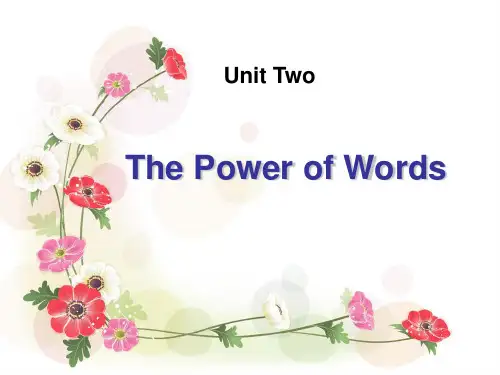

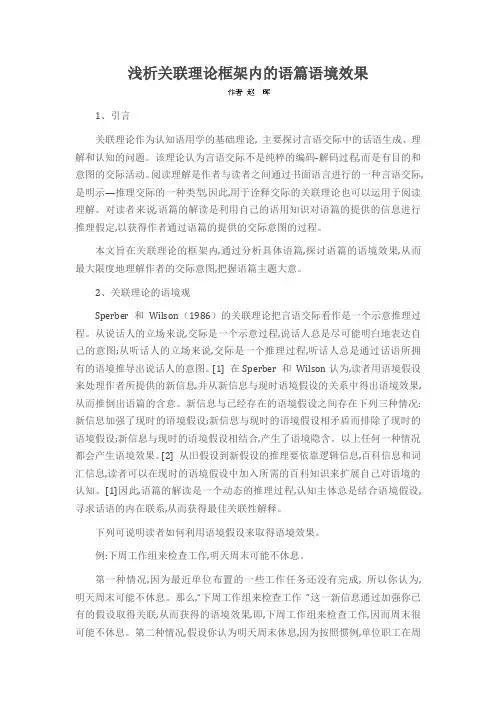
浅析关联理论框架内的语篇语境效果1、引言关联理论作为认知语用学的基础理论, 主要探讨言语交际中的话语生成、理解和认知的问题。
该理论认为言语交际不是纯粹的编码-解码过程,而是有目的和意图的交际活动。
阅读理解是作者与读者之间通过书面语言进行的一种言语交际,是明示—推理交际的一种类型,因此,用于诠释交际的关联理论也可以运用于阅读理解。
对读者来说,语篇的解读是利用自己的语用知识对语篇的提供的信息进行推理假定,以获得作者通过语篇的提供的交际意图的过程。
本文旨在关联理论的框架内,通过分析具体语篇,探讨语篇的语境效果,从而最大限度地理解作者的交际意图,把握语篇主题大意。
2、关联理论的语境观Sperber 和Wilson(1986)的关联理论把言语交际看作是一个示意推理过程。
从说话人的立场来说,交际是一个示意过程,说话人总是尽可能明白地表达自己的意图;从听话人的立场来说,交际是一个推理过程,听话人总是通过话语所拥有的语境推导出说话人的意图。
[1] 在Sperber 和Wilson认为,读者用语境假设来处理作者所提供的新信息,并从新信息与现时语境假设的关系中得出语境效果,从而推倒出语篇的含意。
新信息与已经存在的语境假设之间存在下列三种情况:新信息加强了现时的语境假设;新信息与现时的语境假设相矛盾而排除了现时的语境假设;新信息与现时的语境假设相结合,产生了语境隐含。
以上任何一种情况都会产生语境效果。
[2] 从旧假设到新假设的推理要依靠逻辑信息,百科信息和词汇信息,读者可以在现时的语境假设中加入所需的百科知识来扩展自己对语境的认知。
[1]因此,语篇的解读是一个动态的推理过程,认知主体总是结合语境假设,寻求话语的内在联系,从而获得最佳关联性解释。
下列可说明读者如何利用语境假设来取得语境效果。
例:下周工作组来检查工作,明天周末可能不休息。
第一种情况,因为最近单位布置的一些工作任务还没有完成, 所以你认为, 明天周末可能不休息。
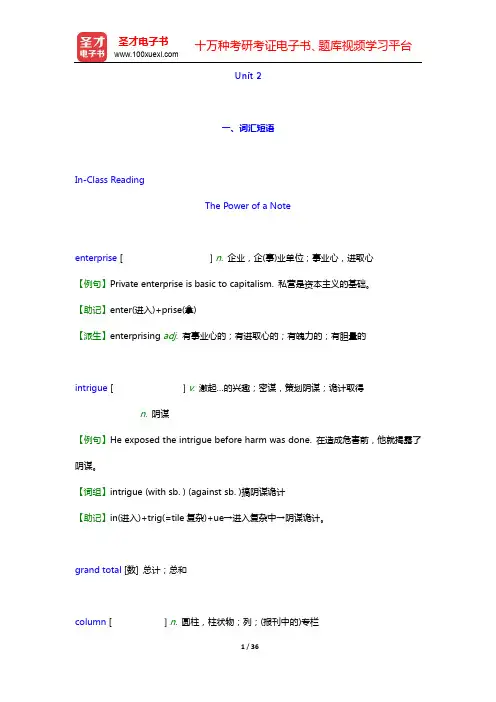
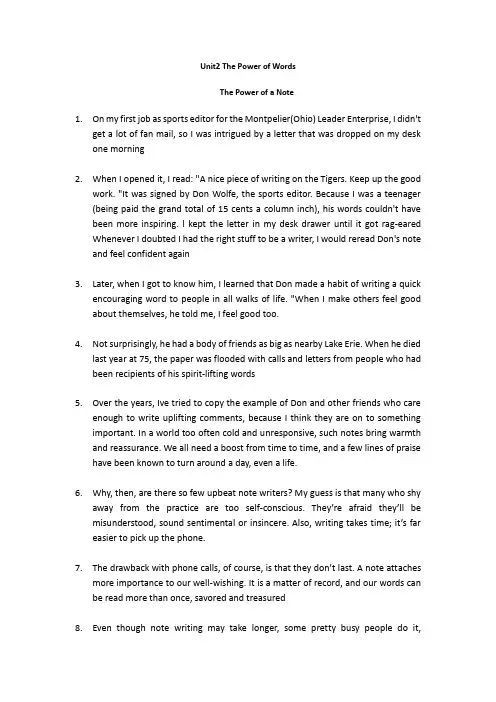
Unit2 The Power of WordsThe Power of a Note1.On my first job as sports editor for the Montpelier(Ohio) Leader Enterprise, I didn'tget a lot of fan mail, so I was intrigued by a letter that was dropped on my desk one morning2.When I opened it, I read: "A nice piece of writing on the Tigers. Keep up the goodwork. "It was signed by Don Wolfe, the sports editor. Because I was a teenager (being paid the grand total of 15 cents a column inch), his words couldn't have been more inspiring. l kept the letter in my desk drawer until it got rag-eared Whenever I doubted I had the right stuff to be a writer, I would reread Don's note and feel confident againter, when I got to know him, I learned that Don made a habit of writing a quickencouraging word to people in all walks of life. "When I make others feel good about themselves, he told me, I feel good too.4.Not surprisingly, he had a body of friends as big as nearby Lake Erie. When he diedlast year at 75, the paper was flooded with calls and letters from people who had been recipients of his spirit-lifting words5.Over the years, Ive tried to copy the example of Don and other friends who careenough to write uplifting comments, because I think they are on to something important. In a world too often cold and unresponsive, such notes bring warmth and reassurance. We all need a boost from time to time, and a few lines of praise have been known to turn around a day, even a life.6.Why, then, are there so few upbeat note writers? My guess is that many who shyaway from the practice are too self-conscious. They’re afraid they’ll be misunderstood, sound sentimental or insincere. Also, writing takes time; it’s far easier to pick up the phone.7.The drawback with phone calls, of course, is that they don’t last. A note attachesmore importance to our well-wishing. It is a matter of record, and our words can be read more than once, savored and treasured8.Even though note writing may take longer, some pretty busy people do it,including George Bush. Some say he owes much of his success in politics to his ever-ready pen. How? Throughout his career he has followed up virtually every contact with a cordial response-a compliment, a line of praise or a nod of thanks.His notes go not only to friends and associates, but to casual acquaintances and total strangers-like the surprised person who got a warm pat on the back for lending Bush an umbrella.9.Even top corporate managers, who have mostly affected styles of leadership thatcan be characterized only as tough, cold and aloof, have begun to learn the lesson, and earn the benefits, of writing notes that lift people up. Former Ford chairman Donald Peterson who is largely credited for turning the company round in the 19bos, made it a practice to write positive messages to associates every day. "I’d just scribble them on a memo pad or the corner of a letter and pass them along, "he says.” The most important ten minutes of your day are those you spend doing something to boost the people who work for you.10.Too often, he observed, people we genuinely like have no idea how we feel aboutobserved, "people we genuinely like have no idea how we feel about them. Too often we think, I haven't said anything critical; why do I have to say something positive? We forget that human beings need positive reinforcement-in fact, we thrive on it!”11.What does it take to write letters that lift spirits and warm hearts? Only awillingness to express our appreciation. The most successful practitioners include what I call the four “S’s” of note writing.12.1) They are sincere. No one wants false praise.13.2) They are usually short. If you can't say what you want to say in three sentences,you're probably straining14.3) They are specific. Complimenting a business colleague by telling him "goodspeech" is too vague; "great story about Warren Buffet s investment strategy" is precise.15.4) They are spontaneous. This gives them the freshness and enthusiasm that willlinger in the reader's mind long afterward.16.It's difficult to be spontaneous when you have to hunt for letter-writing materials,so I keep paper, envelopes and stamps close at hand, even when I travel. Fancy stationery isn't necessary; it's the thought that counts.17.So, who around you deserves a note of thanks or approval? A neighbor, yourlibrarian, a relative, your mayor, your mate, a teacher, your doctor? You don’t need to be poetic. If you need a reason, look for a milestone, the anniversary of a special event you shared, or a birthday or holiday. For the last 25 years, for example, I’ve prepared an annual Christmas letter for long-distance friends, and I often add a handwritten word of thanks or congratulations. Acknowledging some success or good fortune that has happened during the year seems particularly appropriate considering the spirit of the Christmas season18.Be generous with your praise. Superlatives like "greatest, ""smartest, ""prettiestmake us all feel good. Even if your praise is a little ahead of reality, remember that expectations are often the parents of dreams fulfilled.19.Today I got a warm, complimentary letter from my old boss and mentor, NormanVincent Peale. His little note to me was full of uplifting phrases, and it sent me to my typewriter to compose a few overdue letters of my own. I don't know if they will make anybody else's day, but they made mine. As my friend Don Wolfe said, making others feel good about themselves makes me feel good too.。
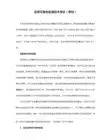
They say that pride comes before a fall. In the case of both Napoleon and Hitler, the many victories they enjoyed led them to believe that anything was possible, that nothing could stand in their way. Russia's icy defender was to prove them wrong.人道是骄兵必败。
就拿拿破仑和希特勒两人来说吧,他们所向披靡,便以为自己战无不胜,不可阻挡。
但俄罗斯的冰雪卫士证明他们错了。
The Icy DefenderNila B. Smith1 In 1812, Napoleon Bonaparte, Emperor of the French, led his Grand Army into Russia. He was prepared for the fierce resistance of the Russian people defending their homeland. He was prepared for the long march across Russian soil to Moscow, the capital city. But he was not prepared for the devastating enemy that met him in Moscow -- the raw, bitter, bleak Russian winter.冰雪卫士奈拉·B·史密斯1812年,法国皇帝拿破仑·波拿巴率大军入侵俄罗斯。
他准备好俄罗斯人民会为保卫祖国而奋勇抵抗。
他准备好在俄罗斯广袤的国土上要经过长途跋涉才能进军首都莫斯科。
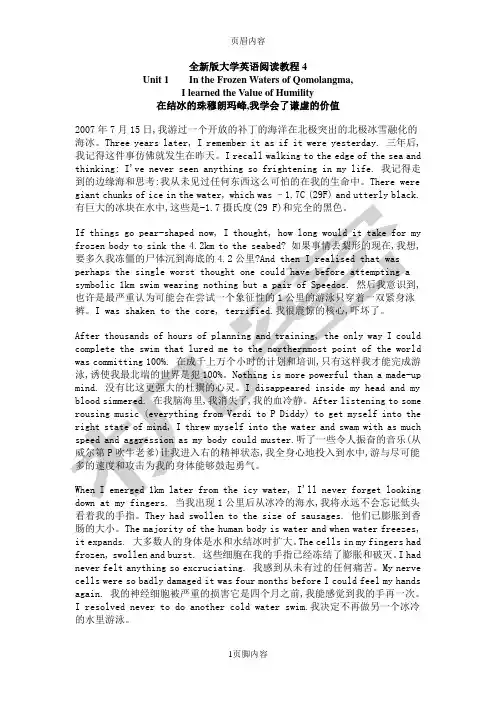
全新版大学英语阅读教程4Unit 1 In the Frozen Waters of Qomolangma,I learned the Value of Humility在结冰的珠穆朗玛峰,我学会了谦虚的价值2007年7月15日,我游过一个开放的补丁的海洋在北极突出的北极冰雪融化的海冰。
Three years later, I remember it as if it were yesterday. 三年后,我记得这件事仿佛就发生在昨天。
I recall walking to the edge of the sea and thinking: I've never seen anything so frightening in my life. 我记得走到的边缘海和思考:我从未见过任何东西这么可怕的在我的生命中。
There were giant chunks of ice in the water, which was –1.7C (29F) and utterly black.,,从看着我的手指。
They had swollen to the size of sausages. 他们已膨胀到香肠的大小。
The majority of the human body is water and when water freezes, it expands. 大多数人的身体是水和水结冰时扩大。
The cells in my fingers had frozen, swollen and burst. 这些细胞在我的手指已经冻结了膨胀和破灭。
I had never felt anything so excruciating. 我感到从未有过的任何痛苦。
My nerve cells were so badly damaged it was four months before I could feel my hands again. 我的神经细胞被严重的损害它是四个月之前,我能感觉到我的手再一次。
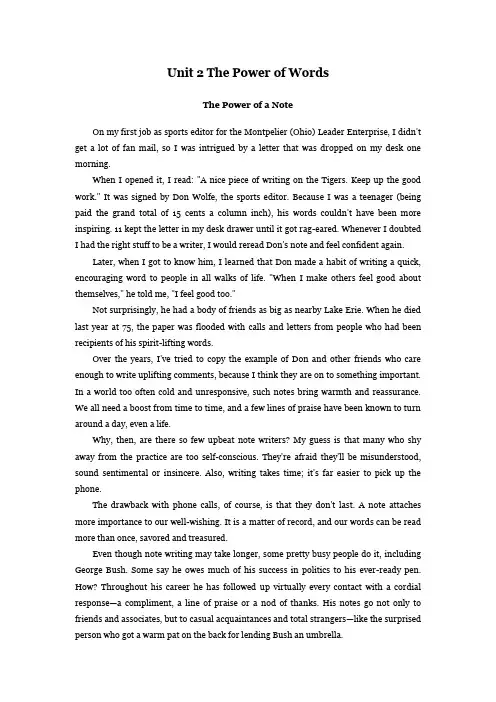
Unit 2 The Power of WordsThe Power of a NoteOn my first job as sports editor for the Montpelier (Ohio) Leader Enterprise, I didn't get a lot of fan mail, so I was intrigued by a letter that was dropped on my desk one morning.When I opened it, I read: "A nice piece of writing on the Tigers. Keep up the good work." It was signed by Don Wolfe, the sports editor. Because I was a teenager (being paid the grand total of 15 cents a column inch), his words couldn't have been more inspiring. 11 kept the letter in my desk drawer until it got rag-eared. Whenever I doubted I had the right stuff to be a writer, I would reread Don's note and feel confident again.Later, when I got to know him, I learned that Don made a habit of writing a quick, encouraging word to people in all walks of life. "When I make others feel good about themselves," he told me, "I feel good too."Not surprisingly, he had a body of friends as big as nearby Lake Erie. When he died last year at 75, the paper was flooded with calls and letters from people who had been recipients of his spirit-lifting words.Over the years, I've tried to copy the example of Don and other friends who care enough to write uplifting comments, because I think they are on to something important. In a world too often cold and unresponsive, such notes bring warmth and reassurance. We all need a boost from time to time, and a few lines of praise have been known to turn around a day, even a life.Why, then, are there so few upbeat note writers? My guess is that many who shy away from the practice are too self-conscious. They're afraid they'll be misunderstood, sound sentimental or insincere. Also, writing takes time; it's far easier to pick up the phone.The drawback with phone calls, of course, is that they don't last. A note attaches more importance to our well-wishing. It is a matter of record, and our words can be read more than once, savored and treasured.Even though note writing may take longer, some pretty busy people do it, including George Bush. Some say he owes much of his success in politics to his ever-ready pen. How? Throughout his career he has followed up virtually every contact with a cordial response—a compliment, a line of praise or a nod of thanks. His notes go not only to friends and associates, but to casual acquaintances and total strangers—like the surprised person who got a warm pat on the back for lending Bush an umbrella.Even top corporate managers, who have mostly affected styles of leadership that can be characterized only as tough, cold and aloof, have begun to learn the lesson, and earn the benefits, of writing notes that lift people up. Former Ford chairman Donald Peterson, who is largely credited for turning the company round in the 1980s, made it a practice to write positive messages to associates every day. "I'd just scribble them on a memo pad or the corner of a letter and pass them along," he says. "The most important ten minutes of your day are those you spend doing something to boost the people who work for you."Too often," he observed, "people we genuinely like have no idea how we feel about them. Too often we think, I haven't said anything critical; why do I have to say something positive? We forget that human beings need positive reinforcement—in fact, we thrive on it!"What does it take to write letters that lift spirits and warm hearts? Only a willingness to express our appreciation. The most successful practitioners include what I call the four "S's" of note writing.1) They are sincere. No one wants false praise.2) They are usually short. If you can't say what you want to say in three sentences, you're probably straining3) They are specific. Complimenting a business colleague by telling him "good speech" is too vague; "great story about Warren Buffet's investment strategy" is precise.4) They are spontaneous. This gives them the freshness and enthusiasm that will linger in the reader's mind long afterward.It's difficult to be spontaneous when you have to hunt for letter-writing materials, so I keep paper, envelopes and stamps close at hand, even when I travel. Fancy stationery isn't necessary; it's the thought that counts.So, who around you deserves a note of thanks or approval? A neighbor, your librarian, a relative, your mayor, your mate, a teacher, your doctor? You don't need to be poetic. If you need a reason, look for a milestone, the anniversary of a special event you shared, or a birthday or holiday. For the last 25 years, for example, I've prepared an annual Christmas letter for long-distance friends, and I often add a handwritten word of thanks or congratulations. Acknowledging some success or good fortune that has happened during the year seems particularly appropriate considering the spirit of the Christmas season.Be generous with your praise. Superlatives like "greatest," "smartest," "prettiest" make us all feel good. Even if your praise is a little ahead of reality, remember that expectations are often the parents of dreams fulfilled.Today I got a warm, complimentary letter from my old boss and mentor, Norman Vincent Peale. His little note to me was full of uplifting phrases, and it sent me to my typewriter to compose a few overdue letters of my own. I don't know if they will make anybody else's day, but they made mine. As my friend Don Wolfe said, making others feel good about themselves makes me feel good too.便笺的力量1 我当体育编辑,最早是为蒙比利埃(俄亥俄州)的《企业导报》工作,当时我很少收到体育迷的来信。
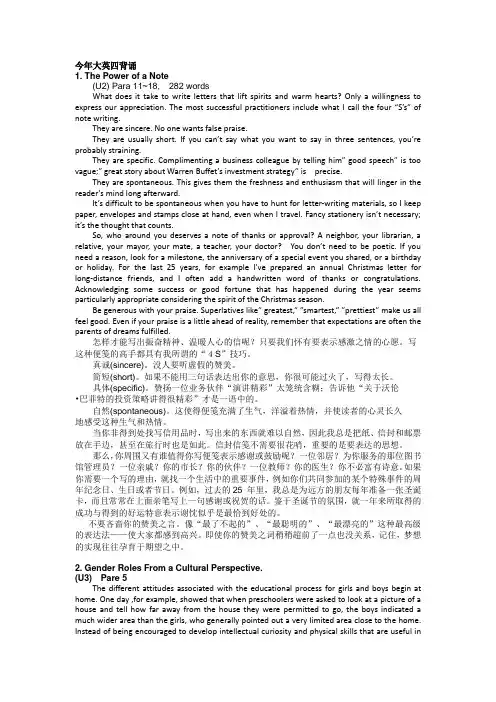
今年大英四背诵1. The Power of a Note(U2) Para 11~18, 282 wordsWhat does it take to write letters that lift spirits and warm hearts? Only a willingness to express our appreciation. The most successful practitioners include what I call the four “S’s” of note writing.They are sincere. No one wants false praise.They are usually short. If you can’t say what you want to say in three sentences, you’re probably straining.They are specific. Complimenting a business colleague by telling him” good speech” is too vag ue;” great story about Warren Buffet’s investment strategy” is precise.They are spontaneous. This gives them the freshness and enthusiasm that will linger in the reader’s mind long afterward.It’s difficult to be spontaneous when you have to hunt for let ter-writing materials, so I keep paper, envelopes and stamps close at hand, even when I travel. Fancy stationery isn’t necessary; it’s the thought that counts.So, who around you deserves a note of thanks or approval? A neighbor, your librarian, a relative, your mayor, your mate, a teacher, your doctor? You don’t need to be poetic. If you need a reason, look for a milestone, the anniversary of a special event you shared, or a birthday or holiday. For the last 25 years, for example I’ve prepared an annual C hristmas letter for long-distance friends, and I often add a handwritten word of thanks or congratulations. Acknowledging some success or good fortune that has happened during the year seems particularly appropriate considering the spirit of the Christmas season.Be generous with your praise. Superlatives like” greatest,” ”smartest,” ”prettiest” make us all feel good. Even if your praise is a little ahead of reality, remember that expectations are often the parents of dreams fulfilled.怎样才能写出振奋精神、温暖人心的信呢?只要我们怀有要表示感激之情的心愿。
外研社,新编大学英语综合教程4Unit2 The Power of WordsQuiz答案1. Choose the most appropriate word or phrase to complete each of the followingsentences.1. Watch-making and tourism are the chief __________ of that country.A. projectsB. campaignsC. enterprisesD. investments2. The newspaper devoted a __________ to the discussion of the development of the suburbs.A. columnB. cornerC. queueD. row3. He wanted her to believe that he was __________ in what he had told her.A. generousB. sincereC. empiricalD. acceptable4. The major read the order and then passed it __________ to the commander.A. awayB. offC. alongD. apart5. I caught my shirt on a nail and nearly had it torn __________.A. offB. upC. awayD. down6. The policeman __________ his shoulders as if to say there was nothing he could do about thematter.A. switchedB. shruggedC. liftedD. folded7. Our club __________ seven new members at the last meeting.A. enrolledB. ensuredC. enrichedD. entitled8. Her humorous remarks seemed __________, but were in fact carefully prepared beforehand.A. preciseB. blankC. spontaneousD. bold9. Jane's __________ for gardening is evident by all of these beautiful flowers.A. acquaintanceB. familiarityC. achievementD. enthusiasm10. My wool sweater __________ when I washed it.A. toleratedB. withdrewC. shrankD. flooded11. I caught a __________ of the bus before it disappeared around the corner.A. visionB. glimpseC. guiseD. view12. He is __________ to getting up early and doing morning exercise in the nearby park every day.A. intendedB. accustomedC. probableD. related13. Robinson's photographs are __________ by the intense contrasts of dark and light areas, and theconsequent loss of detail.A. evokedB. savoredC. dedicatedD. characterized14. This __________ sight attracts the camera enthusiasts to Swanland from where excellentphotographs of the bridge can be taken.A. impressiveB. delightfulC. inspiringD. expressive15. He was rather __________ about the reasons why he never finished school.A. vividB. rudeC. toughD. vague16. It seems I __________ you an apology—I was supposed to phone you on Saturday night.A. oweB. earnC. paidD. deserve2. Complete the following sentences with the appropriate form of the words in the brackets.17.The conversation was limited by myYour answer Correct answerimperfect imperfect18.The couple shared a romanticYour answer Correct answerintimacy intimacy19.Your answer Correct answerlengthy lengthy20.It is wise to usejob. (grammar)Your answer Correct answergrammatical grammatical21.And all this praise just because the poor man has died—(sincere)Your answer Correct answerinsincere insincere22.Your answer Correct answervisual visual23.Your answer Correct answerpoetic poetic24.Your answer Correct answercomplimentary complimentary25.Your answer Correct answerpermission permission26.Psychologists have been studyinghuman mental process connected with sight. (perceive)Your answer Correct answerperception perception27.(assume)Your answer Correct answerassumption assumption28.He believes that a certain amount of(rebel)Your answer Correct answerrebellious rebellious29.Your answer Correct answerreassurances reassurances30.Your answer Correct answerexpectation expectation3. Complete the following sentences with the appropriate phrases from the box.31.My piano playing has improvedYour answer Correct answersignificantly significantly32.Your answer Correct answerobjectively objectively33.Children'sYour answer Correct answeracquisition acquisition34.There is littleYour answer Correct answerindication indication35.All she was interested in was theYour answer Correct answeradvancement advancement36.Considering the problems he's had, there can be little(expect)Your answer Correct answerexpectation expectation。
新编大学英语第四册课文翻译及课后答案.txt机会就像秃子头上一根毛,你抓住就抓住了,抓不住就没了。
我和你说了10分钟的话,但却没有和你产生任何争论。
那么,我们之间一定有个人变得虚伪无比!过错是短暂的遗憾,错过是永远的遗憾。
相遇是缘,相知是份,相爱是约定,相守才是真爱。
课内阅读参考译文及课后习题答案(Book 4)Unit 1享受幽默—什么东西令人开怀?1 听了一个有趣的故事会发笑、很开心,古今中外都一样。
这一现象或许同语言本身一样悠久。
那么,到底是什么东西会使一个故事或笑话让人感到滑稽可笑的呢?2 我是第一次辨识出幽默便喜欢上它的人,因此我曾试图跟学生议论和探讨幽默。
这些学生文化差异很大,有来自拉丁美洲的,也有来自中国的。
我还认真地思考过一些滑稽有趣的故事。
这么做完全是出于自己的喜好。
3 为什么听我讲完一个笑话后,班上有些学生会笑得前仰后合,而其他学生看上去就像刚听我读了天气预报一样呢?显然,有些人对幽默比别人更敏感。
而且,我们也发现有的人很善于讲笑话,而有的人要想说一点有趣的事却要费好大的劲。
我们都听人说过这样的话:“我喜欢笑话,但我讲不好,也总是记不住。
”有些人比别人更有幽默感,就像有些人更具有音乐、数学之类的才能一样。
一个真正风趣的人在任何场合都有笑话可讲,而且讲了一个笑话,就会从他记忆里引出一连串的笑话。
一个缺乏幽默感的人不可能成为一群人中最受欢迎的人。
一个真正有幽默感的人不仅受人喜爱,而且在任何聚会上也往往是人们注意的焦点。
这么说是有道理的。
4 甚至有些动物也具有幽默感。
我岳母从前经常来我们家,并能住上很长一段时间。
通常她不喜欢狗,但却很喜欢布利茨恩—我们养过的一条拉布拉多母猎犬。
而且,她们的这种喜欢是相互的。
布利茨恩在很小的时候就常常戏弄外祖母,当外祖母坐在起居室里她最喜欢的那张舒适的椅子上时,布利茨恩就故意把她卧室里的一只拖鞋叼到起居室,并在外祖母刚好够不到的地方蹦来跳去,一直逗到外祖母忍不住站起来去拿那只拖鞋。
课内阅读参考译文及课后习题答案(Book 4)Unit 1享受幽默—什么东西令人开怀?1 听了一个有趣的故事会发笑、很开心,古今中外都一样。
这一现象或许同语言本身一样悠久。
那么,到底是什么东西会使一个故事或笑话让人感到滑稽可笑的呢?2 我是第一次辨识出幽默便喜欢上它的人,因此我曾试图跟学生议论和探讨幽默。
这些学生文化差异很大,有来自拉丁美洲的,也有来自中国的。
我还认真地思考过一些滑稽有趣的故事。
这么做完全是出于自己的喜好。
3 为什么听我讲完一个笑话后,班上有些学生会笑得前仰后合,而其他学生看上去就像刚听我读了天气预报一样呢?显然,有些人对幽默比别人更敏感。
而且,我们也发现有的人很善于讲笑话,而有的人要想说一点有趣的事却要费好大的劲。
我们都听人说过这样的话:―我喜欢笑话,但我讲不好,也总是记不住。
‖有些人比别人更有幽默感,就像有些人更具有音乐、数学之类的才能一样。
一个真正风趣的人在任何场合都有笑话可讲,而且讲了一个笑话,就会从他记忆里引出一连串的笑话。
一个缺乏幽默感的人不可能成为一群人中最受欢迎的人。
一个真正有幽默感的人不仅受人喜爱,而且在任何聚会上也往往是人们注意的焦点。
这么说是有道理的。
4 甚至有些动物也具有幽默感。
我岳母从前经常来我们家,并能住上很长一段时间。
通常她不喜欢狗,但却很喜欢布利茨恩—我们养过的一条拉布拉多母猎犬。
而且,她们的这种喜欢是相互的。
布利茨恩在很小的时候就常常戏弄外祖母,当外祖母坐在起居室里她最喜欢的那张舒适的椅子上时,布利茨恩就故意把她卧室里的一只拖鞋叼到起居室,并在外祖母刚好够不到的地方蹦来跳去,一直逗到外祖母忍不住站起来去拿那只拖鞋。
外祖母从椅子上一起来,布利茨恩就迅速跳上那椅子,从它那闪亮的棕色眼睛里掠过一丝拉布拉多式的微笑,无疑是在说:―啊哈,你又上了我的当。
‖5 典型的笑话或幽默故事由明显的三部分构成。
第一部分是铺垫(即背景),接下来是主干部分(即故事情节),随后便是妙语(即一个出人意料或令人惊讶的结尾)。
课内阅读参考译文及课后习题答案(Book 4)Unit 1享受幽默—什么东西令人开怀?1 听了一个有趣的故事会发笑、很开心,古今中外都一样。
这一现象或许同语言本身一样悠久。
那么,到底是什么东西会使一个故事或笑话让人感到滑稽可笑的呢?2 我是第一次辨识出幽默便喜欢上它的人,因此我曾试图跟学生议论和探讨幽默。
这些学生文化差异很大,有来自拉丁美洲的,也有来自中国的。
我还认真地思考过一些滑稽有趣的故事。
这么做完全是出于自己的喜好。
3 为什么听我讲完一个笑话后,班上有些学生会笑得前仰后合,而其他学生看上去就像刚听我读了天气预报一样呢?显然,有些人对幽默比别人更敏感。
而且,我们也发现有的人很善于讲笑话,而有的人要想说一点有趣的事却要费好大的劲。
我们都听人说过这样的话:“我喜欢笑话,但我讲不好,也总是记不住。
”有些人比别人更有幽默感,就像有些人更具有音乐、数学之类的才能一样。
一个真正风趣的人在任何场合都有笑话可讲,而且讲了一个笑话,就会从他记忆里引出一连串的笑话。
一个缺乏幽默感的人不可能成为一群人中最受欢迎的人。
一个真正有幽默感的人不仅受人喜爱,而且在任何聚会上也往往是人们注意的焦点。
这么说是有道理的。
4 甚至有些动物也具有幽默感。
我岳母从前经常来我们家,并能住上很长一段时间。
通常她不喜欢狗,但却很喜欢布利茨恩—我们养过的一条拉布拉多母猎犬。
而且,她们的这种喜欢是相互的。
布利茨恩在很小的时候就常常戏弄外祖母,当外祖母坐在起居室里她最喜欢的那张舒适的椅子上时,布利茨恩就故意把她卧室里的一只拖鞋叼到起居室,并在外祖母刚好够不到的地方蹦来跳去,一直逗到外祖母忍不住站起来去拿那只拖鞋。
外祖母从椅子上一起来,布利茨恩就迅速跳上那椅子,从它那闪亮的棕色眼睛里掠过一丝拉布拉多式的微笑,无疑是在说:“啊哈,你又上了我的当。
”5 典型的笑话或幽默故事由明显的三部分构成。
第一部分是铺垫(即背景),接下来是主干部分(即故事情节),随后便是妙语(即一个出人意料或令人惊讶的结尾)。
课内阅读参考译文及课后习题答案(Book 4)Unit 1享受幽默—什么东西令人开怀?1 听了一个有趣的故事会发笑、很开心,古今中外都一样。
这一现象或许同语言本身一样悠久。
那么,到底是什么东西会使一个故事或笑话让人感到滑稽可笑的呢?2 我是第一次辨识出幽默便喜欢上它的人,因此我曾试图跟学生议论和探讨幽默。
这些学生文化差异很大,有来自拉丁美洲的,也有来自中国的。
我还认真地思考过一些滑稽有趣的故事。
这么做完全是出于自己的喜好。
3 为什么听我讲完一个笑话后,班上有些学生会笑得前仰后合,而其他学生看上去就像刚听我读了天气预报一样呢?显然,有些人对幽默比别人更敏感。
而且,我们也发现有的人很善于讲笑话,而有的人要想说一点有趣的事却要费好大的劲。
我们都听人说过这样的话:“我喜欢笑话,但我讲不好,也总是记不住。
”有些人比别人更有幽默感,就像有些人更具有音乐、数学之类的才能一样。
一个真正风趣的人在任何场合都有笑话可讲,而且讲了一个笑话,就会从他记忆里引出一连串的笑话。
一个缺乏幽默感的人不可能成为一群人中最受欢迎的人。
一个真正有幽默感的人不仅受人喜爱,而且在任何聚会上也往往是人们注意的焦点。
这么说是有道理的。
4 甚至有些动物也具有幽默感。
我岳母从前经常来我们家,并能住上很长一段时间。
通常她不喜欢狗,但却很喜欢布利茨恩—我们养过的一条拉布拉多母猎犬。
而且,她们的这种喜欢是相互的。
布利茨恩在很小的时候就常常戏弄外祖母,当外祖母坐在起居室里她最喜欢的那张舒适的椅子上时,布利茨恩就故意把她卧室里的一只拖鞋叼到起居室,并在外祖母刚好够不到的地方蹦来跳去,一直逗到外祖母忍不住站起来去拿那只拖鞋。
外祖母从椅子上一起来,布利茨恩就迅速跳上那椅子,从它那闪亮的棕色眼睛里掠过一丝拉布拉多式的微笑,无疑是在说:“啊哈,你又上了我的当。
”5 典型的笑话或幽默故事由明显的三部分构成。
第一部分是铺垫(即背景),接下来是主干部分(即故事情节),随后便是妙语(即一个出人意料或令人惊讶的结尾)。
The Power of a NoteOn my first job as sports editor for the Montpelier (Ohio) Leader Enterprise, I didn't get a lot of fan mail, so I was intrigued by a letter that was dropped on my desk one morning.[2] When I opened it, I read: "A nice piece of writing on the Tigers. Keep up the good work." It was signed by Don Wolfe, the sports editor. Because I was a teenager (being paid the grand total of 15 cents a column inch [N], his words couldn't have been more inspiring. [N] I kept the letter in my desk drawer until it got rag-eared. Whenever I doubted I had the right stuff to be a writer [N], I would reread Don's note and feel confident again.[3] Later, when I got to know him, I learned that Don made a habit of [N] writing a quick, encouraging word [N] to people in all walks of life. "When I make others feel good about themselves," he told me, "I feel good too."[4] Not surprisingly, he had a body of friends as big as nearby Lake Erie [N]. When he died last year at 75, the paper was flooded with calls and letters [N] from people who had been recipients of his spirit-lifting words.[5] Over the years, I've tried to copy the example of Don and other friends who care enough to write uplifting comments, because I think they are on to something important. In a world too often cold and unresponsive, such notes bring warmth and reassurance. We all need a boost from time to time, and a few lines of praise have been known to turn around a day [N], even a life.[6] Why, then, are there so few upbeat note writers? My guess is that many who shy away from the practice are too self-conscious [N]. They're afraid they'll be misunderstood, sound sentimental or insincere. Also, writing takes time; it's far easier to pick up the phone.[7] The drawback with phone calls, of course, is that they don't last. A note attaches [N] more importance to our well-wishing. It is a matter of record [N], and our words can be read more than once, savored and treasured.[8] Even though note writing may take longer, some pretty busy people do it, including George Bush. Some say he owes [N] much of his success in politics to his ever-ready [N] pen. How? Throughout his career he has followed up virtually every contact with a cordial response—a compliment, a line of praise or a nod of thanks. [N] His notes go not only to friends and associates, but to casual acquaintances and total strangers—like the surprised person who got a warm pat on the back for lending Bush an umbrella.[9] Even top corporate managers, who have mostly affected styles of leadership that can be characterized only as tough, cold and aloof, have begun to learn the lesson, and earn the benefits, of writing notes that lift people up. [N] Former Ford chairman Donald Peterson, who is largely credited for turningthe company round in the 1980s, made it a practice to write positive messages to associates every day. [N] "I'd just scribble them on a memo pad or the corner of a letter and passthem along," he says. "The most important ten minutes of your day are those you spend doing something to boost the people who work for you."[10] "Too often," he observed, "people we genuinely like have no idea how we feel about them. Too often we think, I haven't said anything critical; why do I have to say something positive? We forget that human beings need positive reinforcement—in fact, we thrive on it!"[11] What does it take to write letters that lift spirits and warm hearts? [N] Only a willingness to express our appreciation. The most successful practitioners include what I call the four "S's" of note writing.[12] 1) They are sincere. No one wants false praise.[13] 2) They are usually short. If you can't say what you want to say in three sentences, you're probably straining [N].[14] 3) They are specific. Complimenting a business colleague by telling him "good speech" is too vague; "great story about Warren Buffet's investment strategy" is precise.[15] 4) They are spontaneous. This gives them the freshness and enthusiasm that will linger in the reader's mind long afterward.[16] It's difficult to be spontaneous when you have to hunt for letter-writing materials, so I keep paper,envelopes and stamps close at hand, even when I travel. Fancy stationery isn't necessary; it's the thought that counts.[17] So, who around you deserves a note of thanks or approval? A neighbor, your librarian, a relative, your mayor, your mate, a teacher, your doctor? You don't need to be poetic. If you need a reason, look for a milestone, the anniversary of a special event you shared, or a birthday or holiday. For the last 25 years, for example, I've prepared an annual Christmas letter for long-distance friends, and I often add a handwritten word of thanks or congratulations. Acknowledging some success or good fortune that has happened during the year seems particularly appropriate considering the spirit of the Christmas season.[18] Be generous with your praise. Superlatives like "greatest", "smartest", "prettiest" make us all feel good. Even if your praise is a little ahead of reality, remember that expectations are often the parents of dreams fulfilled. [N][19] Today I got a warm, complimentary letter from my old boss and mentor, Norman Vincent Peale. His little note to me was full of uplifting phrases, and it sent me to my typewriter to compose a few overdue letters of my own. I don't know if they will make anybody else's day, but they made mine. As my friend Don Wolfe said, making others feel good about themselves makes me feel good too. (978 words)。